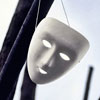The Amazing Phineas Quimby: The Mind Can Heal The Body
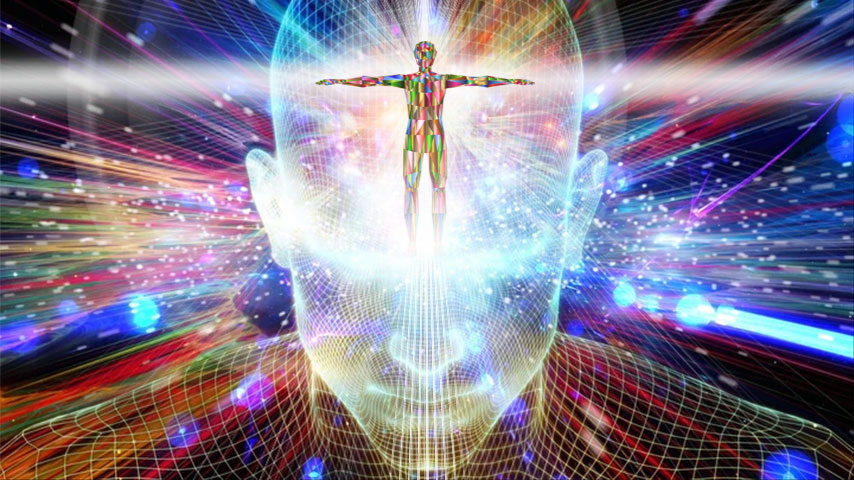 by Tara Yarlagadda
by Tara Yarlagadda
Science, religion and medicine have intermingled (and sometimes clashed) in fascinating ways throughout the course of human history. And one little-remembered, controversial American figure symbolizes this clash better than most: Phineas Parkhurst Quimby, whose writings, unpublished during 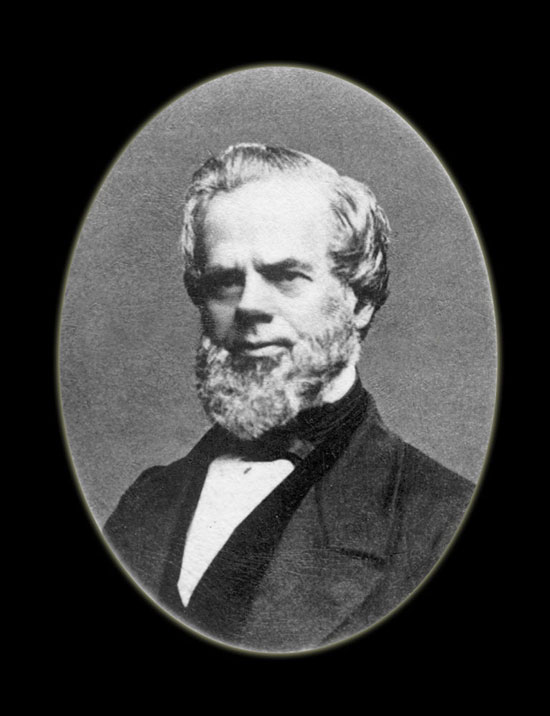 his time, provided the underpinnings for the New Thought movement, which is based on the idea that the spirit is more powerful and real than matter and the mind has the ability to heal the body.
his time, provided the underpinnings for the New Thought movement, which is based on the idea that the spirit is more powerful and real than matter and the mind has the ability to heal the body.
Reverend Lux Newman is a clinical hypnotherapist who edited and published “The Complete Collected Works of Dr. Phineas Parkhurst Quimby” in 2013. She describes his work as essentially a sort of 19th-century precursor to the modern field of psychology.
“He called himself a physician. I would also say that he was a psychologist. Because he studied the mind…he talked about things that were very peculiar that had nothing to do with his day and time. Like chemical changes taking place in the brain. This is over 150 years ago. He was observing the placebo effect and many other things that would be under the realm of psychology,” said Newman.
Quimby (also known as PPQ for short or “Dr. Quimby” to his patients) was born in 1802 in New Hampshire. As an adult, he built clocks and watches, but his true vocation would come in the form of his work in the realm of healing. Quimby possessed no formal institutional training in medicine and was often skeptical of the prowess of doctors who did. The following quote is an excerpt from the Quimby manuscripts, which were a collection of Quimby’s key writings and articles, edited and published by his disciple Horatio W. Dresser decades after Quimby’s death:
“Thus man is a mere lump of clay in the hands of blind guides and whatever they say to the people they believe. Their beliefs disturb their minds and the doctors sow the seed of disease which they nurse till it grows to a belief, then comes the misery.”
Disdain for Medical Doctors
Quimby’s mistrust of doctors grew out of personal experience. Quimby himself was once deathly ill (he probably had tuberculosis) and was diagnosed as a hopeless cause by a medical doctor. Quimby had all but given up on life, but found his life force renewed by a vigorous horseback ride. This experience set off Quimby’s lifelong disdain for the medical profession and his passionate exploration of the human mind, which started with studies of animal magnetism — which pertains to mysterious forces said to influence individuals, including hypnosis — and expanded over time to using his psychological understanding to diagnose diseases of the mind. Newman notes that Quimby’s teachings were radical for the time, because although he acknowledged Jesus in his field of work, he disavowed all major religions and disputed belief in the power of God as a means of curing individuals.
“He opposed all religions. These are just beliefs and opinions. And he said you should never trust somebody else’s belief or opinion. It isn’t the truth. It’s just a belief. You can’t prove it. He believed in science. He called science ‘wisdom,'” said Newman. “He believed that there was a method of science that could be used for healing. He called it thought and reasoning. He didn’t cure people by any special means or power.”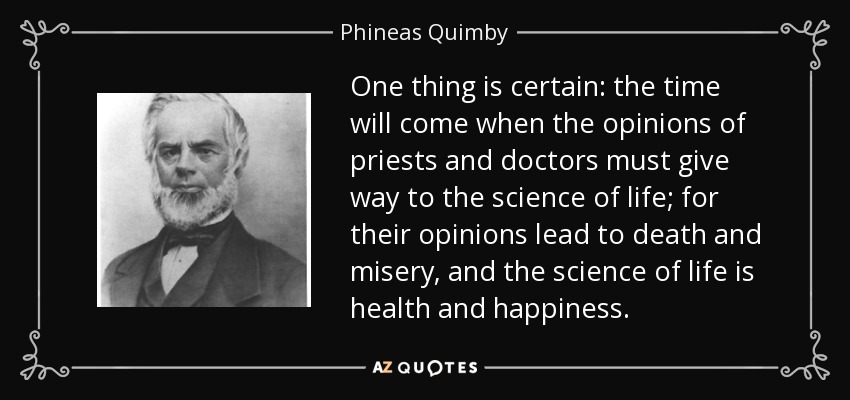 Keith McNeil, author of the academic study, “A Story Untold: A History of the Quimby-Eddy Debate,” cites a passage from one of Quimby’s flyers to lay out how the treatment method worked in practice:
Keith McNeil, author of the academic study, “A Story Untold: A History of the Quimby-Eddy Debate,” cites a passage from one of Quimby’s flyers to lay out how the treatment method worked in practice:
“PPQ simply sits down by the patients, tells them their feelings and what they think is their disease. If the patients admit that he tells them their feelings, etc., then his explanation is the cure; and, if he succeeds in correcting their error, he changes the fluids of the system and establishes the truth, or health. The Truth is the Cure. This mode of practice applies to all cases. If no explanation is given, no charge is made, for no effect is produced.”
So, essentially, Quimby listened to patients explain their ailments, and if there was a mental source contributing to their disease — say, anxiety — Quimby would then diagnose and explain that phenomenon in a way the patient could understand. He called these diagnoses “the truth.” His research delved into metaphysics, underscoring how the body was just a vessel for the five senses and the faculties of the human mind, according to Newman.
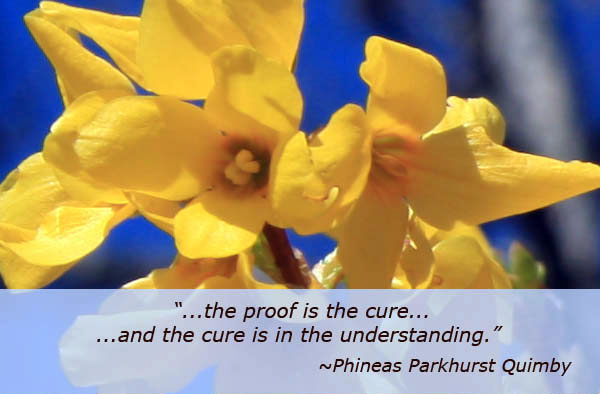 The Mind-Body Connection
The Mind-Body Connection
McNeil further explains that “PPQ believed that the human mind could create material conditions such as disease, so that it was necessary to change the human mind to create a healing condition.”
However, Newman maintains that Quimby did not believe that all diseases stem from the mind, unlike one of his disciples, Mary Baker Eddy, who eventually founded the Christian Science religious denomination that focused on spiritual healing and divine connection to God.
“You can’t cure some diseases just by the power of your mind like Mary Baker Eddy claimed. This is ridiculous. It puts people responsible for their own diseases when some of them are definitely not their fault. Some can be. And those would be the ones where the explanation would be the cure. Otherwise, they’d better get to a doctor,” says Newman.
In an age when it feels like everyone has a therapist on hold, Quimby’s approach to healing may not seem like anything visionary, but it was an unorthodox method for the time. However, despite Quimby’s spurning of organized religion, he did imbue his course of treatment with some spiritual inklings and reference to Jesus. McNeil describes the unique way that Quimby blended these different worlds.
“He was not a religious leader, but he knew the Bible and tried to bring his philosophical and metaphysical views together with religious themes. (It was customary for non-medical healers, mesmerists, faith healers, etc. to liken their methods to Jesus.)”
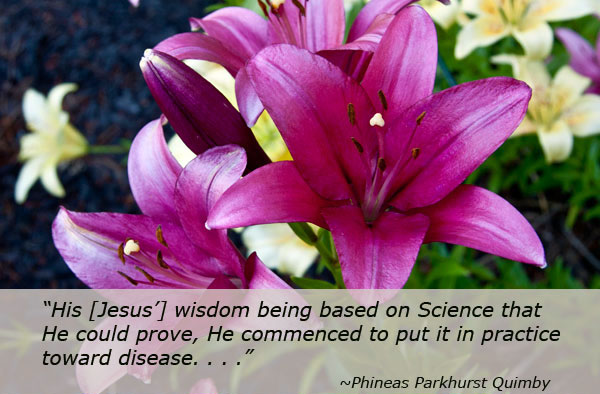 Here are just a few excerpts of writings and quotes by the amazing Dr. Phineas P. Quimby
Here are just a few excerpts of writings and quotes by the amazing Dr. Phineas P. Quimby
Medicine contains nothing to me – except as an effect – and if a patient believes he must use it, I sometimes allow him to do so – but I always tell him the cure is in himself (or in his belief) – and not in the medicine.” ~ Phineas Parkhurst Quimby
Concerning The Use Of Medicine
I am frequently asked if I am opposed to the use of medicine. To this question I answer that, as the people are now educated, they believe a lie as a truth; and therefore to tell such persons the truth would be, to them, like telling lies. So I would not destroy the law, but fulfill it; and wisdom is the end of the law, to all who believe.
To those who believe in disease, there is, according to their belief, neither forgiveness, nor cure – except through the medium of medicine. But to those who have been “born again” (or who have learned that disease is the result of a belief) – disease has no power, and consequently medicine is useless.
“Seek ye first the kingdom of God, and all these things shall be added unto you.” That is, seek first the science of health – which is wisdom – and then all things will appear plain to your understanding.
To take a person who believes in disease to cure the sick is like taking the hair of a dog to cure the dog’s wounds, or like punishing a crime by a penalty similar to the offense; which barbaric custom is still kept up and sustained, as much as the medical faculty. All remedies are based on the law of health. The doctors admit health to be the standard and a deviation from it, a crime deserving punishment.
So if you have any complaint, you are examined by the doctors; and if found guilty, a blister, emetic or some other proper punishment is administered, till you repent. And then, if life enough remains in you, and you are not found guilty of other offenses, you recover. And if not, you are found guilty of another offense.
Now if by explanation simply, a person can be cleared from the charges brought against him, without the use of any remedies and be thereby convinced of his error and can learn to do good – which is to understand – then he is “born again” and ready to enter the kingdom of heaven (or science). He can then enter this world of opinions and plead the cause of the sick and rescue them from the hands of their enemies, without paying any great penalty.
Perhaps if the criminal believes he must take a little cathartic to pay the debt that he has contracted, he may be allowed to take it – not because the person rescuing him believes it to be necessary, or because the criminal is liable – but because it gratifies the patient, who believes there is honor, even among thieves. His protector only yields to an old prejudice, which still clings to him. When Paul converted a person (or performed a cure), and the patient wished to be baptized, he complied – not because he believed there was any creative properties in the water – but simply to gratify the convert.
There are a class of ideas (or persons) who are never satisfied, until they cause the poor to suffer for their sins. Man is a government of himself, and some have certain animal propensities which cause them to torment themselves; and such feel happier to be punished, like the man in the days of the Salem witchcraft who, believing himself to be possessed of a witch, was not content till he was beaten almost to death, in order to show that the witch might be cast out.
The sick at the present day are not satisfied, till they have been purged and blistered almost to death, in order to kill the disease (or witch) which possesses them. When the reformation came, reason took the place of the stake and whip; so when science shall come, wisdom will take the place of the drugs of the physicians and the tormenting hell fire of the priests. Men will be guided by the star of science, which points the way to wisdom. But medicine will be administered to the sick till the time when science shall step in and make a sacrifice of all these errors – and then will come the end.
Jesus, seeing the folly of the world’s belief, offered himself (or his opinions) as a willing sacrifice to the world, in order to show man a higher and better way to salvation (or the recovery of one’s health). And then he rose from the natural world into the scientific world, there to appear in heaven (or science) for us. Once for all, he laid down his life (or belief) and put his trust in science, believing it is able to cure the sick and save man from his sins (or errors).
The priests and doctors are still offering up sacrifices in the form of opinions, prayers and blisters, etc. – none of which can take away the sins (or errors) of the world. When science comes, it makes an end to all these deceptions and introduces a new mode of reasoning to all who will receive it. The new heaven is this new mode of reasoning, and to enter into it is to be baptized in the blood (or belief) of Jesus, which is Christ (or science), and which will wash away all opinions.
I baptize with water, but when the real truth rises out of your opinions, then you will be baptized with fire (or wisdom) and the Holy Ghost. The Holy Ghost is science (or the explanation of the father), which is wisdom. All persons who come to the truth must be “born again” (or baptized).
And it is not strange, as in the case of the disciples, if some persons should cling to the old ideas; and therefore we must sometimes yield to their superstition. If they believe themselves ill with a bilious disease and cannot consent to go through the fire of truth – but wish to be baptized of their old ideas – then we must administer some simple medicine – not that it possesses any curative qualities – but simply as an offering to their ignorance, which they imagine must be made; otherwise they cannot recover (or be pardoned of their sins).
Medicine contains nothing to me, except as an effect – and if a patient believes he must use it, I sometimes allow him to do so; but I always tell him the cure is in himself (or in his belief), and not in the medicine. If schools were established where persons could be taught to correct the errors of the sick in regard to disease, then they could approach the sick, armed with science, and the opinions of the sick would melt away before their reasoning, as darkness before the light of the sun.
Disease is a cowardly belief, and he who knows it is, to the sick, as a teacher to his pupil. The errors of the pupil can be destroyed by the wisdom of the teacher. The passengers on board the steamer can be enlightened by the wisdom of the Captain. But if he is as ignorant as they, and the ship, encountering a gale, succeeds in coming out safely, it is not by the skill of the captain but by a universal wisdom that sometimes guides man through the darkness, unknown to all. A person outside of all those beliefs in disease is, to the sick, a saviour – whether the sick are aware of it or not; but if they know it of themselves, they become their own pilots.
It may appear strange, at first thought, that belief can cure us – but it is readily admitted that belief can make us sick. Now I affirm that the belief is the very thing that I wish to destroy. If there was nothing to believe, we should have no belief. When you see a person you know to be your friend, you do not fear he will hurt you; but to have a belief that he might injure you – you might have some cause for your belief. Whether real or imaginary, to you it is real. Now if you were aware that your suspicions were wrong, the belief that he would injure you would vanish.
So with disease. The error is the same. The cause was invented by the superstition of the world, and the people have been so imposed upon, through their ignorance, by the priests, that the idea “disease” has taken a living form and now is, to man, as real as his existence; and yet in reality, it is as false as the religion. The time of the foundations of the Mohammedan religion can be ascertained – but now it is a living reality, with as much life as the Catholic or Protestant Church and contains as much truth as either of these.
Now seeing how ideas affect the mind, I find that when I correct the ideas, I cure the sick. The body suffers exactly as the mind is affected.” ~ Phineas Parkhurst Quimby
Curing Without Medicine
The idea of curing disease without medicine is a new idea and requires quite a stretch of the imagination to believe it, and to me it was as strange as to any person; but having had twenty-five years of experience, I have found out that all our evils are the result of our education and that we imbibe ideas that contain the evils that we complain of.
Ideas are like food, and every person knows that in almost everything we eat and drink, there is some idea attached. So ideas are food for the mind, and every idea has its effect on mankind. Now seeing how ideas affect the mind, I find that when I correct the ideas, I cure the sick.
For instance, the idea “liver disease” produces such-and-such a feeling, and heart disease certain kinds of symptoms. I might go on for hours giving the names and symptoms of diseases. Now if the people have all these diseases – for I know they have the feelings – then how can they be cured without the use of medicine? I contend they have all the symptoms that they say they have, but about the causes of them, I shall differ with the world.
The doctors say they have this disease or that disease, according to the symptoms that they say they have, and therefore they must take some medicine. This false doctrine has taken possession of the people’s minds, and they believe it as firmly as the South believes that slavery is right. We see how the belief in slavery affected the masses. It took possession of their lives, and it became a part of their identity; and it gave to them a peculiar character, different from the people of the North. The North believed slavery was wrong, and their belief gave to them a character; and I leave the people to judge what is the most Christian-like belief.
It is impossible to make man act differently from his belief, unless he feels a sort of condemnation; therefore, for a northern man to believe in slavery, he must be more depraved than a southern man; for one believes it right – and if the northern man believes it right, he is reasoning against all his early religious education. So I cannot believe him honest, for I cannot admit he is so ignorant as not to be affected by the influences around him. His party has blinded him into an admission of what he does not believe.
So parties are formed, and every person belongs to some one or another, and their lives are made up of the ideas. Every form of religion has its advocates, and persons are affected just according to their belief. The body suffers exactly as the mind is affected. Any belief that binds burdens on another binds them on ourselves. Therefore, to do unto others as we would have others do unto us is the fulfilling of the law.
Now I have been so connected with man’s beliefs and have seen how they affect the body, that I am sure that three-fourths of the misery can be stopped by explaining the causes. This I know I can do in public. When I first commenced operating on the mind, I put persons into a mesmeric sleep, but this soon lost its effect, for I could see no good results – only to gratify my curiosity. At last I found I could make my subjects read my thoughts – and here was a new discovery.
Now I disbelieve in diseases and remedies as understood by the world and know that diseases and all their remedies are man’s invention. And the whole effect is brought about by their own belief.” ~ Phineas Parkhurst Quimby
Is There Any Curative Quality in Medicine?
Is there any curative quality in medicine? Common opinion would answer that there is, and according to my opinion there is – but it is all owing to the patient’s belief. To perfect wisdom, there is no curative virtue in medicine.
I will relate one case out of a hundred to show how medicine proves itself, according to the patient’s belief (or the direction of some other person). I was attending a gentleman who was sick, and he thought he had consumption but was not fully settled in his own mind. So of course he was very nervous. Under this nervousness, the glands around the throat were excited and kept him hacking and raising a white, frothy substance; and also kept him heated, which heat would be thrown off in a perspiration.
After I had told him the cause of his trouble, the explanation, so far as he understood it, relieved him. He breathed more easily and was improving. One day he read in a paper an advertisement of a medicine which would cure the catarrh and prevent the discharges from the head. Thinking it might cure him, he bought a bottle and commenced taking it; but instead of lessening the secretion, it grew worse, and he ran down very fast.
My theory explains the fact in this way. His belief admitted that his head was diseased and in the condition of a sore and that the medicine would cure it. Under this belief the glands of the nose were excited, and the medicine then proved his belief that the matter was in his head; for it was taken to make the head discharge. His belief did this by exciting the glands, and the medicine was taken to throw it off. So when the matter, and even blood, commenced running, it showed that the medicine was doing what it agreed to do.
But another belief came up that I had given him, for I had exposed the absurdity of medicine, and after he saw the effect, he remembered what I had told him. And abandoning his medicine, he returned to me again, and in a few days, recovered what he had lost.
This is how the disease worked. His own wisdom (or knowledge) produced the phenomenon. His knowledge gave the medicine the praise or blame, just as people give God the praise for their own acts, while the devil has to take the blame for their troubles.
I have observed the effect of medicine and have found that there is more virtue or misery in the advertisement than in the medicine. Everyone knows how the mouth will water by a desire for something that the person wants, and how the mouth and throat will become parched by fear of detection in crime. This was known by the ancients and magicians and from the fact that the mind could be changed by fear, so that criminals could be detected – those who understood it took advantage of it to detect a thief. The magicians made a paste that would dissolve when laid on the tongue of a person in a perfectly calm state of mind; but in case of unusual warmth or feverish thirst, it would not dissolve.
So when a theft was committed by the servants, all the people were collected in one room, and the magician was sent for. Believing in his power, their minds, of course, were controlled by their knowledge; and if the thief were present, he knew it and being sure of detection, grew nervous. This would prevent the glands from acting and thus bring out his guilt. The others, feeling innocent, were safe; for if they were nervous, it did not produce the state of mind to prevent the paste from dissolving. So the mind was the medium to detect the thief; and out of his own mouth, he was condemned.
People put extravagant confidence in medicine, supposing that it contains curative qualities. Frequently Indian doctors appear who have discovered an herb or root to cure some disease that man is afflicted with, as though God had made both the disease and its cure. The same class of people say that God has made a remedy for every disease, showing that their superstition is woven into a belief that God made all diseases and made medicines to cure them. This is the belief of mankind, and it is not strange that man has gone out of the way.
Now I disbelieve in diseases and remedies, as understood by the world, and know that diseases and all their remedies are man’s invention, and the whole effect is brought about by their own belief. Here is my belief in regard to the way diseases are brought about. If you tell a lie or a truth to a person, and the person believes it – the effect on the person is the disease. To cure him is to expose the falsehood to his senses. To do this, I use my reason for medicine, and it acts as a stimulant or alternative, as the case may be; while the doctors apply their remedies in the form of medicine.
The opinion that God has provided a remedy for every disease gives rise to a belief that there are certain roots and herbs intended by the Creator to cure all diseases. Absurd as this seems, it is the belief of ninety-nine out of a hundred. This being the case, a door is open to quackery – for new discoveries will come up every day. Dr. Herrick’s pills, Ayers’ sarsaparilla and countless others are advertised as the cure-all, being the result of long acquaintance with vegetable medicines and their curative qualities. Then follow certificates of cures and of recommendations from some M.D., and these give the medicines a run.
Next a man comes who exhibits the effect of laughing gas and also states that it will cure neuralgia and rheumatism, and the sick rush to him for a time. After he goes, a learned M.D. arrives with flaring advertisements announcing free lectures on anatomy and the digestive organs. He explains the action of these organs and dwells upon the danger of getting sick by over-eating and drinking; receives some fifty dollars from the poor sick and leaves.
Among the throng of humbugs, when all seems dark and despairing, an announcement is whispered into the ear of the sick that God has opened a way for their recovery and sent an angel of mercy, who has discovered a flower that will cure everything that can be cured. So here is introduced an impostor who will give Lobelia emetics, till they cease to affect the patient, pretending that all diseases must yield to it. This has its day, and another comes up. All this goes to show that the mind of man is like an old fiddle – played on by every kind of quackery relating to roots and herbs.
Now I know all about these things. With my wisdom, I understand them all, as Job said to Zophar, “What ye know, the same do I know, also; I am not inferior unto you.” I use nothing – yet I could easily use all kinds of drugs.
Then Job said “Ye are forgers of lies, ye all physicians of no value. Oh, that ye would altogether hold your peace, and it should be your wisdom.” This expresses the opinion of Job about the classes I have mentioned.
He said at another time “No doubt that ye are the people – and wisdom shall die with you.” He saw that these wise men and philosophers were an injury to the progress of science. His God was a God of wisdom and proved all things by his science. Therefore, he knew all they knew and saw it was only an opinion. So he said their wisdom would die with them. But he knew that his wisdom would not; for his life was in his wisdom – and that was his science. He could see that all they said amounted to nothing. Job believed in a God but had not really attached his own senses to his wisdom as a progressive being.
I have seen the working of popular belief and know that diseases and remedies are the invention of man, and the very proof which is brought to establish their wisdom goes to substantiate what I say. For instance, an emetic – everyone thinks it is to clean out the stomach. So when people have eaten too much, they can take a Lobelia emetic. Also, if they think their lungs are diseased – take a Lobelia emetic. And if they have the dropsy – take the same.
Now I will call your attention to what this belief amounts to, carried out toward God. What kind of a God is it that made the earth to bring forth trees, herbs and everything that hath life? All this was before man was created; therefore did he make these medicines and the codfish with a liver to cure consumption, before the disease was made? This belief would certainly suppose that God made the remedies before the disease – and if he made all the remedies these quacks say he did, he certainly is the greatest enemy to mankind. Absurd as this sounds, we believe it and are affected by our beliefs; and this makes man the most dependent of all God’s creatures. He is merely a target to be fired at by every person’s opinion.
I can show by facts that every person will admit that no kind of medicine has any more effect, of itself, than almost any kind of food or drink that we use daily – but our ignorance placed some kind of virtue in them, as we place wisdom in someone’s opinion. The truth, which places all disease in the mind, can explain the operation of remedies.
God is wisdom, and man is opinion. Therefore, man cannot live in wisdom and be diseased. But the child of wisdom reduced to science is held in bondage by opinions; and to show that there are diseases, according to the belief of man, is to show that they are made by circumstances which cannot be controlled, except by correcting the error that brought them about; while ignorance would prescribe some medicine that God had made from the foundation of the world.
For more interesting literature by Dr. Quimby visit here.
The Quimby Manuscripts pdf here.
Posted in Health, Other Topics, Spiritualitywith comments disabled.





